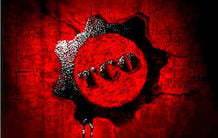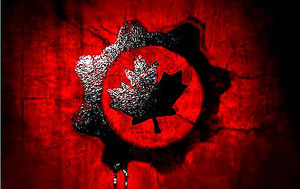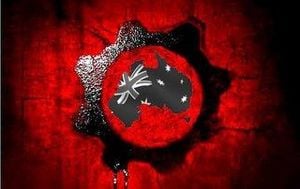The Crimson Order
| ||||||
| ||||||
The Crimson Order (formerly: Bruck's Canucks) was a global paramilitary organisation that originated in ![]() Canada. It consisted of three divisions: Crimson Canucks (
Canada. It consisted of three divisions: Crimson Canucks (![]() Canada), Crimson Devils (
Canada), Crimson Devils (![]() Australia) and Crimson Guard (
Australia) and Crimson Guard (![]() South Africa).
South Africa).
TCO welcomed players of all ranks and skills, providing them training and supplies, but also required them to work in one of the TCO-operated companies. The Crimson Order was ranked 4th in the Top Damage Ranking of private militia. [1]
TCO existed for 4 years, and due to huge drop in activity, it was disbanded, but Crimson Retirement Home unit was created for all of the old TCO soldiers.
History
Summer 2009: Bruck's Canucks
After the Battle of Ontario, eCanada was lost completely to PEACE forces. The invasion of Canada had cost the official Canadian army, Canadian Armed Forces (CAF), a great deal and by the end of the war they were unable to provide many of their members with guns. For all Canadians, these were the darkest days of World War III. A group of seasoned warriors turned to former PM Bruck to create a resistance force that would allow them to fight for the return of Canada's regions without joining the financially strapped Canadian Armed Forces. They contributed gold, Bruck spent a day formulating a milita plan, and Bruck's Canucks were formed.
The original members included a "Who's Who" of eCanadian fighters and leaders: Tyler F Durden was the first to join. He was followed quickly by Augustus Baldwin, Spencer Magee, Ralph de Ver, Alias Vision, Kilgore Trout 89, Addy Lawrence, Gofarman and others. Many of the original members are still active in the organization.Pooling their resources, the Canucks purchased companies and organizations to help fund the group. As they grew, members volunteered to work for minimum wage in exchange for access to weapons. The business model was successful and the militia's numbers swelled.
The organization originally eschewed political affiliations. Political ideologies weren't a requirement of membership, just a love of freedom, fierceness on the battlefield and a rebellious spirit. Though many members have held political office, there have never been any party affiliation requirements for membership in TCO and the organisation as a collective remains apolitical.
Fall 2009: Crimson Canucks
Once Bruck's Canucks were well established, Bruck made the decision to pursue other interests in the game. He decided to step down as the leader of the thriving militia and began searching the ranks for a successor. The Canucks' rowdy attitude and attraction to doing things for the lulz made them a challenging force to govern. Though a couple tried, it was finally realized that an irreverent hand was needed at the helm: Rylde was appointed. Rowdy and hard-drinking, Rylde ruled with an iron fist. One of his first decisions was to change the name of the group; soon they would be known as the Crimson Canucks. Their logo - a blood encrusted cog encircling a Maple leaf, quickly became associated with lust for war, irreverent behavior, and a brotherhood of players that stood fearlessly together in the face of any adversity.
Winter 2010: Crimson Devils - Australia
In early 2010, Bruck was living in Australia, where he entered into conversations with political and military leaders about expanding the organization to eAustralia. Underpopulated and living under the constant threat of invasion from Indonesia, the presence of a militia with the Crimson Canucks' resources and dogged determination to defend allies could make a positive impact. Further, Australia and Canada shared having experienced the worst national event eRepublik brings, watching one's homeland overrun by enemy forces until it disappeared. The Crimson Canucks were ready to commit to defending Australia from ever experiencing that again.
A new Division needed a new name and the Crimson Devils created a base in Tasmania. The first attacks came quickly and from an unexpected source, a small Australian power structure. The Crimson Devils, now lacking public support from the leadership that welcomed the expansion privately, were treated as invaders rather than allies, and soon a feud began. The Devils' leader, Rainer N met fire with fire, showing an attitude that was all Crimson: arrogant, fearless and unerringly supportive of his men. The verbal battle helped the Crimson Devils find its eAustralian recruits; players who wanted to fight both globally and at home, who wanted a close brotherhood and whose innate rebelliousness kept them from kowtowing to political powers-that-be. Seeing that the Crimson Devils would prevail, the need for a new organization-wide name became clear. Now international, the two Divisions needed a name that represented their unity: The Crimson Order.
Within a few months, the Devils grew and found their stride. The time came for them to be free of Canadian leadership. A great native leader had emerged, moving quickly through the ranks, from recruit to commanding officer. Homer J Simpson was asked to take the top spot with the Crimson Devils and became their Executive Officer. The Devils are currently all Aussie sons and very proud of it.
Spring 2010: Crimson Guard - South Africa
In March 2010, Bruck was contacted by a community leader from another allied nation. South Africa had been taken over by a deceitful leader who turned the country over to a Political Takeover group. Thanks to backroom agreements, their regions quickly fell to enemies Brazil and Argentina. Could The Crimson Order lend assistance to the people of South Africa? TCO was now consisted of players from two nations that had been overrun. They understood the anger and pain of seeing one's country taken. They also knew well the passion that burned in the heart of every patriot to restore their home and banish the enemy from their shores. A call went out among The Crimson Order's most experienced players, a call to arms in order to aid South African allies. The responses, all resoundingly positive, flooded in. That same night, native resistance forces went to battle to regain a territory. Successful in their mission, Northern Cape was restored to the South African people and the rightful citizens began setting up a structure and a plan. Swiftly, Crimson Order leadership moved to South Africa, committed to helping South Africa reach its goals. They were greeted graciously and immediately given work as voting squads and blocking candidates as well as soldiers. Working with the dedicated, impassioned government and citizenry, TCO helped battle Phoenix and disreputable players in order to restore South African unity. With V2 looming and South Africa being granted High Titanium regions, the constant threat to its sovereignty was clear. As a smaller country it was also more vulnerable to PTOs. Very little discussion was needed to see that The Crimson Order could make a permanent positive impact.
Summer 2010: Expansion and Reorganization
Rylde had previously stepped away from the game due to irl issues. Bruck had stepped in, awaiting Rylde's return. With another expansion looming, Rylde made the decision to leave TCO and the game. Though there were a few inklings that he might return and even attempt a mutiny of one of the Divisions, he finally withdrew from eRep entirely ... at least for the moment.
A new expansion was in the works and, with it, a restructuring of the Order's management to fit its global presence. Someone needed to step to the helm and start pulling the team together. Dycey Farley joined TCO in January 2010. Having lived and fought in the eUS and eAustralia, she already had a more global, big picture view of how the game was played. Serving first as a Platoon Leader, then as the director of Public Relations, Dycey stepped agreed to oversee the restructure of the organization and the creation of new departments. She also took on the newest expansion. In time, Bruck saw the opportunity to step down and entrust the organization to another. In late April 2010 Dycey Farley became the new Crimson Commander.
Ryan Southcombe was another proven leader. Dedicated and skilled at both military and business, he was the perfect candidate to create and lead the new eSouth African Division. The Crimson Guard was established with two platoons and their own companies. Experienced players joined with new recruits to start forming a ready and able eSouth African militia.
A larger organization needed a new form of oversight. The Executives and Officers Unit was created so seasoned leaders could oversee the global enterprise, offering it services from financial planning to V2 preparations and even moral building. Original member Kilgore Trout89 created the Crimson Academy, a training grounds providing both basic education in-game play and TCO procedures as well as an Officers Candidates School for future leadership. A TCO Health Org was created to help members work and fight at the top of their game. And regular events including poker tournaments and Friday Night S**tshows (members get drunk and prank each other and their friends) were organized to further build the already tight brotherhood.
The dust began to settle as recruitment officers brought the best new and experienced soldiers to all three branches, the Academy found its pace and offers for milita work increased. Members were serving as soldiers, congressmen and cabinet members in three countries. Though individual Divisions, The Crimson Order responds in unity should a native country go to war. Troops have fought doggedly, beside national forces and other paramilitary groups, in defense of EDEN and the Brolliance. Stepping up when called, it has defended Australia against Indonesian attacks and helped restore South Africa's regions.
The Crimson Order continued to grow and welcomes new members.
The Crimson Order: Standing Strong, Standing United, Standing on Guard.
Organizational Structure
The Crimson Order was headed by the Crimson Commander while each branch is headed by an Executive Officer. Global management is handled by the Executives and Officers Unit. These people were:
- J. Robert Calder: Crimson Commander
- Duke Of Bruno: Commander Emeritus
- Dycey Farley: Commander Emeritus
- Bruck: Commander Emeritus
Executives and Officers
- Damien Wolf : PR Officer
- Lion El'Jonson: Morale Office
- Homer J Simpson: Academy and Placement
Crimson Canucks
- Crisfire: Commander
- Francois L. Pignon: Canucks Warlord
The Crimson Canucks were divided into twelve legions (Canada Division, Irish Division and Bulgarian Division) averaging 10 members each. Each unit was commanded by a captain and seconded by a lieutenant and sergeant.
First Regiment
- Nogin the nog: Lt. Colonel - Regimental CO
- 2IC: Major
1st Legion Crimson Cavalry
- Captain: Christian Russo
- Lieutenant: Decode Masala
- Sergeant: Roflopolis
2nd Legion Heavy Moose Cavalry
- Captain: Ardikus V2
- Lieutenant: Dr.Pain
- Sergeant: Ralph Kline
3rd Legion Thunder Dirty Beaver Boys
- Captain: dhruvs
- Lieutenant: JokerPunk
- Sergeant: Dagrin Caldari
4th Legion Rabid Wolverines of Death
- Captain: Shannon Matthews
- Lieutenant: MCA421
- Sergeant: SgtVoodoo
5th Legion Northern Knights
- Captain: inspuration
- Lieutenant: MDDkr
- Sergeant: Vacant
Second Regiment
- Eric Last: Lt. Colonel - Regimental CO
- 2IC: Major
6th Legion Screaming Gophers
7th Legion Hell's Guardians
- Captain: Venoms III
- Lieutenant: only atoms
- Sergeant: Rob Mieznik
8th Legion The Crimson Fist
- Captain: Exalted Druid
- Lieutenant: Gobbee
- Sergeant: Vacant
Irish Regiment
9th Legion The Hounds of Culann
Legion X The Legend of the Fianna
- Captain: DashRiprock
- Lieutenant: Marcus Suridius
- Sergeant: Robin Locksley
Bulgarian Regiment
11th Legion Crimson Firebirds
- Captain: Caladbolg Trainer
- Lieutenant: ILoveU2
- Sergeant: Vacant
12th Legion The Madara Riders
- Captain: Damien Wolf Trainer
- Lieutenant: De'ath
- Sergeant: Vacant
Crimson Devils
- Lion El'Jonson: Commander
- Adam Von Templar: Devils Warlord
- Hanibal Smith: Logistics Coordinator
- Viado Celtru: Logistics Coordinator
The Crimson Devils are divided into three legions. Units contain 8-10 members each and are commanded by a captain who is seconded by a lieutenant and sergeant. The current units are:
- 1st Legion: Heavy Kangaroo Cavalry
- 2nd Legion: Dread Knights
- 3rd Legion: Blood Angels
TCO Military Academy
- Homer J Simpson: Academy/Placement Head
Economic
The Crimson Order owned and operated a number of companies. These companies were used in order to provide the members with supplies for military operations and training. The Canucks also received supplementary funding from the Canadian Government.
Military Operations
Bruck's Canucks was founded for participation in WWIII. Though the early battles in which the recently renamed The Crimson Order were involved centered in Canadian provinces, their passion for war and availability as a militia for hire has taken them around the globe. Only officially sanctioned battles are counted in operations statistics, however members are free to engage in any battle of their choosing if no operation is sanctioned.
Liberation of Canada
The Canucks/Order participated in several battles towards the liberation of Canada. These battles are listed in order of their occurrence.
- Battle of Quebec (Victory)
- Battle of Ontario (Victory)
- Battle of British Columbia (Victory)
- Battle of Saskatchewan (Loss)
- Battle of The Yukon (Victory)
- Battle of The Northwest Territories (Victory)
- Battle of Manitoba (Victory)
Liberation of South Africa
The Crimson order was proud to serve in battles to liberate South Africa, including:
- Battle of Gauteng (Victory)
- Battle of Free State (Victory)
- Battle of Mpumalanga (Victory)
- Battle of Eastern Cape (Victory)
- Battle of KwaZulu Natal (Victory)
- Battle of Northwest Province (Victory)
- Battle of Eastern Cape (Victory)
- Battle of Western Cape (Victory)
- Battle of Limpopo (Victory)
Foreign Operations
The Canucks/Order have also participated in some battle outside of Canada. These battles are listed in order of their occurrence.
- The Battle of Northeast Croatia (Victory)
- The Battle of New Jersey (Victory)
- The Battle of Pyongyang (Victory)
- Operation Brazilian Wax (Victory)
- Operation Prince of Fails (Loss)
- Operation Hello Kitty (Victory)
- Operation Tea Bag (Truce called / Treaty signed)
- Operation Lion King (Loss)
Awards and Decorations
The Crimson Order offers decorations for merited service as well as for military service. There were three types of decorations and ribbons: Ranks, Service Medals, Awards of Merit.
Rank Decorations
| Executive Officer | Awarded to members who hold executive positions within TCO. |
| Officer | Awarded to members who hold the position of captain, lieutenant or sergeant. |
| Enlisted Soldier | Awarded to members who do not hold an officer rank. |
Awards of Merit
| Long Service Medal and Ribbon | Awarded to members who have more than 300 posts on the forums. |
| Dedicated Service Medal and Ribbon | Awarded to members who respond to 10 consecutive roll calls |
| Merited Offense Medal and Ribbon | Awarded to members who have dealt 5000 influence in a single battle. |
The Crimson Order also awards decorations for various major battles it is involved in.
Community
|
|


